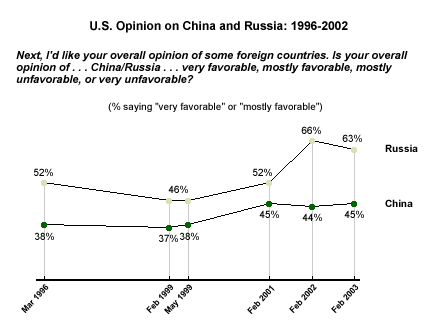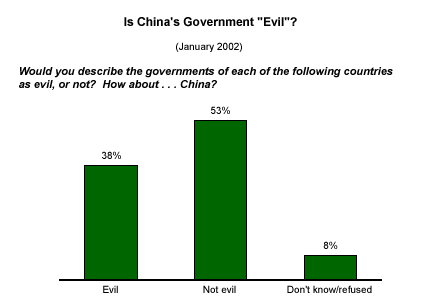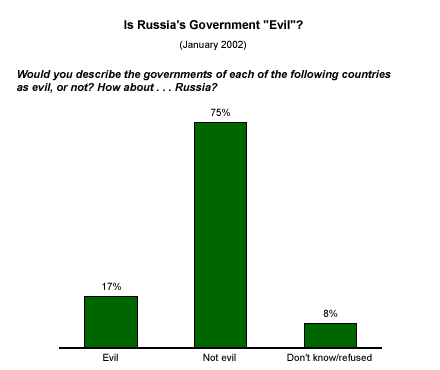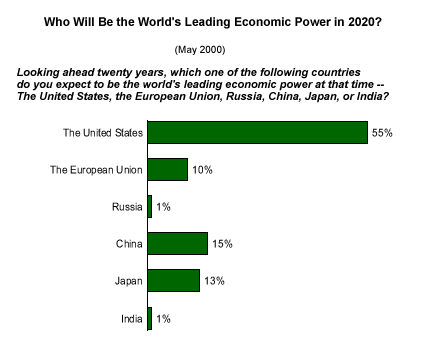Deadlock at the United Nations over Iraq has set the United States at odds with three permanent members of the U.N. Security Council: France, Russia, and China, each of whom have come out strongly against the use of force to resolve the Iraqi crisis. France has definitely taken a hit in terms of American public opinion: a new CNN/USA Today/Gallup poll finds 34% of Americans saying they have a "very" or "somewhat" favorable opinion of France, down from 59% as recently as February 2003, and 79% in February 2002.
But what about the other two countries, each huge nations with which the United States has a history of tense relations? Since the end of the Cold War, have Americans been reframing their opinions of China and Russia to reflect the new global situation? How is the conflict with Iraq likely to affect Americans' evolving perceptions of these countries?
In recent years, Russia has been viewed more positively than China, particularly in the last two years. This may reflect the fact that China remains an authoritarian nation that, despite significant economic reform, continues to suppress certain religious and ethnic groups. Americans' somewhat negative perceptions of China in comparison to Russia also point to a measure of success in Russian President Vladimir Putin's effort to ally his country with the West, particularly in the struggle against terrorism. "Americans' new priorities and worldview post-9/11 have worked to Russia's advantage, image-wise," says Richard Burkholder, Gallup's Director of International Polling. "It's worth noting that Russian President Vladimir Putin provided conspicuous verbal and diplomatic support in the wake of the attacks, and received an enormous amount of favorable press coverage here for doing so."

Ideological Perspective
Other recent findings have provided insight into Americans' ideological perceptions of the two nations. In a poll taken early last year, shortly after Bush coined the phrase "axis of evil" to describe the oppressive regimes of Iraq, Iran, and North Korea, Gallup asked Americans whether they would describe the governments of various countries as "evil." More than a third of Americans (38%) said they considered the Chinese government evil, while considerably less, 17%, said the same about the Russian government.


A poll taken in April 2001, about three weeks after a high-profile incident in which a U.S. reconnaissance plane was intercepted by Chinese fighter jets, asked Americans whether they considered several countries allies or enemies of the United States. China was considered a U.S. ally by just 5% of Americans, "friendly, but not an ally" by 22%, "unfriendly" by 44%, and an enemy of the United States by 25%. Russia fared better, being named an ally by 10% of the American public, "friendly, but not an ally" by 45%, "unfriendly" by 25%, and an enemy of the United States by 13% (since that time, more Americans have come to view Russia as an ally.)
Practical Perspective
Though China's ideological image may reduce the country's favorability ratings by the U.S. public, many Americans also recognize China's practical importance on the world stage. When asked in May 2000 how important events in each of a set of 11 key countries were to the United States, China and Russia emerged at the top of the list, with almost half of Americans saying events in each of these countries are "vitally important" to the United States (48% for China, 46% for Russia). China and Russia were even rated ahead of traditional U.S. allies Great Britain, Canada, and Japan.
The same poll asked Americans to look ahead to 2020 and predict which of several nations would be the world's leading economic power. China was named by 15% of Americans, second only to the United States, on par with Japan (13%) and slightly ahead of the European Union (10%).

The impact that China's economic importance has on Americans' overall impression of China is debatable. But the belief that the United States needs to be on increasingly good terms with China as it gains economic clout may be more prevalent among younger respondents: 55% of those aged 18 to 29 said last month that they have a favorable opinion of China overall, compared to 42% of those aged 30 to 64 and 36% of those 65 and older.
